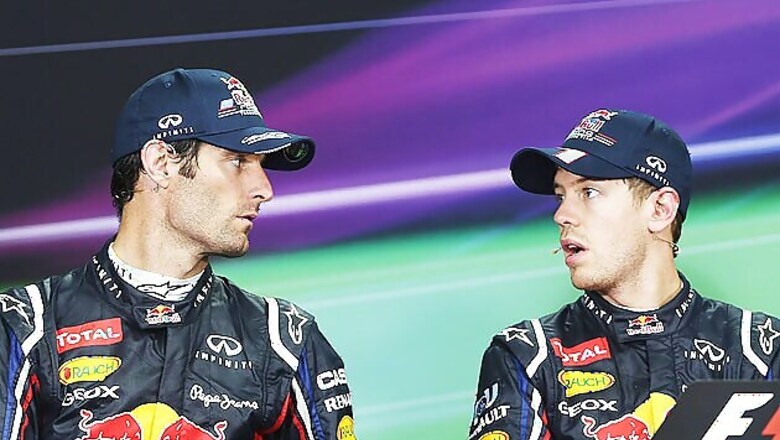
views
London: Sebastian Vettel's 'stab-in-the-back' Malaysian Grand Prix win revived an age-old debate about team orders in Formula One but trust, or the lack of it, could be more of a headache for champions Red Bull in the weeks ahead.
"If you get a situation where there's no trust between the drivers within a team, that is quite corrosive," Britain's 1996 champion Damon Hill said on Sunday after world champion Vettel ignored his team's instructions and passed Australian Mark Webber to snatch victory at Sepang.
Formula One's past is littered with examples of teams riven by internal feuding, with drivers taking matters into their own hands on the track in dramatic and sometimes catastrophic fashion. Admirers of the late and great Gilles Villeneuve will always blame Frenchman Didier Pironi for contributing to his death by 'stealing' a victory from the Canadian at the 1982 San Marino Grand Prix.
Villeneuve was incensed by Pironi overtaking him while the Canadian, leading a Ferrari one-two, slowed to manage fuel and tyres. He never spoke to Pironi again, declaring "From now on, it's war". Two weeks later, in Belgium, the father of 1997 champion Jacques died in qualifying at Zolder as he tried to beat his team-mate's time.
The headline-grabbing animosity between champions Alain Prost and Ayrton Senna at McLaren in the late 1980s, which was thrilling for fans, engendered some superlative battles but also rash and reckless moves. Bad blood between Lewis Hamilton and Fernando Alonso at McLaren in 2007 led to the Spaniard impeding his team-mate in qualifying and picking up a grid penalty that cost him pole. Without the sanction, McLaren would have swept the front row. Both men lost out on the title at the end of the season by one point to Ferrari's Kimi Raikkonen.
FAIR PLAY
What Vettel did at Sepang on Sunday, in ignoring an order to go easy on the tyres and save fuel, was more than a betrayal of a team-mate who had done as he was told and turned down the car's engine. It was a cold breach of sporting etiquette and fair play, a code of conduct epitomised by the selfless actions of the great Stirling Moss in the 1950s, and a failure to put the interests of the team first by risking a collision.
Headlines around the world on Monday spoke of Red Bull, who pride themselves on their unity and focus even if Webber has long accused them of favouring Vettel, as a team 'at war'. Team orders are not illegal, although they once were, and have always been a part of the sport however much that may rankle with the casual viewer who expects to see the fastest car and driver win.
The quick-wearing Pirelli tyres have changed the nature of grand prix racing and even greater adjustments will be required next season. The days when a driver could follow his instincts and race flat-out from start to finish are gone. It is now a question of knowing how hard to push, about going fast enough to win without destroying the tyres.
That may be counter-intuitive for men hard-wired for speed but next year, with the introduction of a new turbo hybrid engine unit, will put an added emphasis on fuel economy. Team orders have caused uproar in the past when one driver has been forced to let another take an undeserved win because of his status within the team - Michael Schumacher's 2002 Austrian Grand Prix victory being the most infamous - or by dint of championship position.
The orders Red Bull issued on Sunday were of a different nature, driven by concern about the tyres and preserving a one-two that was in the bag. Vettel is a triple world champion but Webber was deservedly leading and the team saw no need to switch the positions.
"With the issues we've had this weekend, we wanted to control the race and manage the tyres to the end of the race," said team principal Christian Horner. But at that point the drivers' interest became bigger than the team's and they took it into their own hands to start racing each other which was obviously uncomfortable for us."
Vettel apologised afterwards to Webber for his 'mistake' but, as the angry Australian pointed out, there is no 'rewind button'. The genie has been let out of the bottle and Red Bull will have to deal with it as best they can.
"Red Bull have got a huge problem because the next time they're in that situation, if they're one-two and they want to call off the fight with a few laps to go, he (Webber) is not going to trust anybody," said former racer and Sky television commentator Martin Brundle.
"He's not going to trust them that it will all take place so he will keep racing."
Trust between a driver and his team are essential in a sport whose participants risk life and limb at speeds in excess of 300kph. A driver who disregards instructions is effectively out of control the moment he leaves the pit lane. Vettel, a smiling 'baby Schumacher' betraying the sort of ruthless streak found in many champions and particularly his retired compatriot, has shown already where his priorities lie. The danger for Red Bull is that Webber, who will be 37 this year and is possibly in his last season, also shows selective hearing in future.




















Comments
0 comment